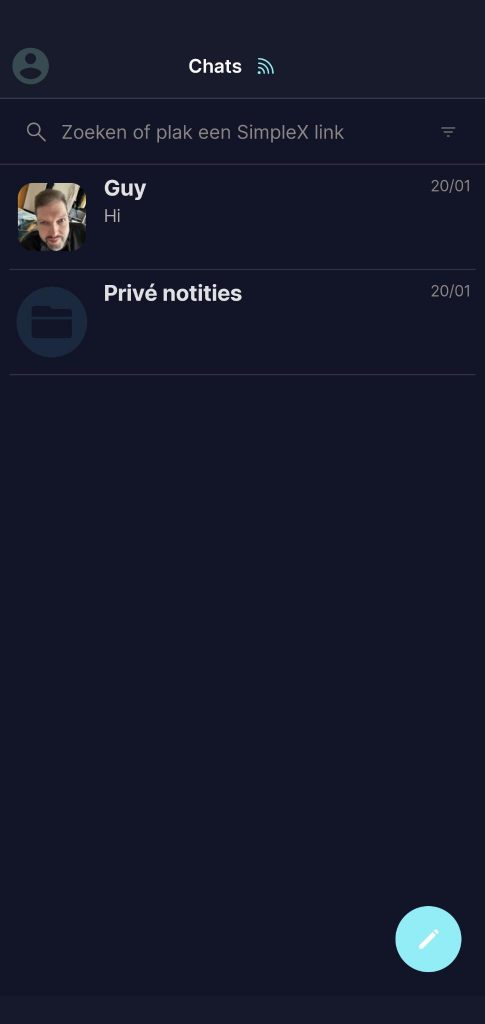Contact us for more infomation about SimpleX, to help you get set up with SimpleX or to host your own servers, either on your own servers or hosted on our infrastructure
What is Simplex?

SimpleX chat is the first messenger that has no user IDs (not even randomly generated). It does not require a phone number or E-mail address to create an ‘account’ because there are no accounts. And no phone number also means it can be used on any device be it a PC, tablet or smartphone even if it has no SIM.
In addition to that, SimpleX is decentralized, meaning that no one entity controls it and you can run your own servers while retaining the possibility to communicate with users on any other operator.
All this together make it the most secure, private and anonymous messenger currently available. And even though it is still fairly new, it is quite usable today.
What is the problem with other messengers?
A lot of messenges today are what is called end to end encrypted (e2e), which means that in principle, only the sender and recipient can read messages. The most well known is WhatsApp which implements the Signal protocol. Some messengers like Telegram lack that feature which means that the provider can read the content of your messages.
But in the class of secure (encrypted) messenger, there are two big categories, on one side we have proprietary messengers (WhatsApp), on the other we have Open Source messengers like Signal and Element.
Proprietary messengers have the inherent problem that you need to blindly trust the provider and there is no way to know there are no backdoors. But even the Open Source messengers share a problem with the closed source ones, most of them leak metadata. Metadata is everything but the content of the message, it’s data like who is talking to who, from where and when. Metadata is a goldmine for marketing and selling that data is what makes a profit for proprietary messengers like WhatsApp.
For the longest time, Signal has been the gold standard for any of those two classes and even WhatsApp adopted it’s encryption protocol. But Signal never managed to solved the issue with leaking of metadata. To make things worse, like WhatsApp signal requires a phone number to register so that metadata is directly linkable to your real identity.
And even worse, Signal is not a decentralized solution and is hosted on Amazon Web Services. That metadata is leaking well beyond the organization itself. It implemented some measures that are supposed to allow you to communicate without revealing to much metadata like sealed sender and usernames, but those turn out to be mostly theater.
Element (Matrix) is actually decentralized and offers similar functionality to Slack. But though it is much more secure than Slack or alternatives like RocketChat or Mattermost by offering e2e encryption, it also lacks protection of metadata that is often shared with other servers as well. This may not be a problem for an implementation within a company or with a limited amount of external servers, but it doesn’t fit high risk profiles like whistleblowers, journalists or activists either.
Why SimpleX?
SimpleX currently can cover nearly all usecases for any of the other messengers without comprosing any of your metadata. Because it has no userids, it also doesn’t suffer the same spam problem that other platforms have (and never will even after mass adoption) because the only way to connect is by a link that can be replaced whenever your need to (or set it to one-time immediately).
If you are in a high risk group, especially up against an adversary like a government, you absolutely need the protection that this protocol brings. It’s not enough to only protect what you are saying to a confidential contact, it’s important that nobody can see who you are talking too, what groups you are reading or what reactions you give to a message. Even the service operator (which can be you), does not know who you are, neither do the owners of groups you participate in.
Downsides of SimpleX?
SimpleX is pretty usable today, but even more than with Signal, the probability of finding your contacts there is pretty low. The lack of phonenumbers also means there is no automatic discovery of contacts (which is the reason why there won’t be any SPAM either).
SimpleX today has some rough edges, including a higher battery drain while the developers implement a better system to push notifications (without compromising security) and some polish like notifications on mentions in groups are still missing.
Lastly though, no messenger can secure you against compromises of your devices, so if you are a high risk profile and you need a high level of security, don’t use SimpleX on insecure devices, which includes all versions of Google Android and to some degree IOS. Opt for a secure phone with GrapheneOS.


